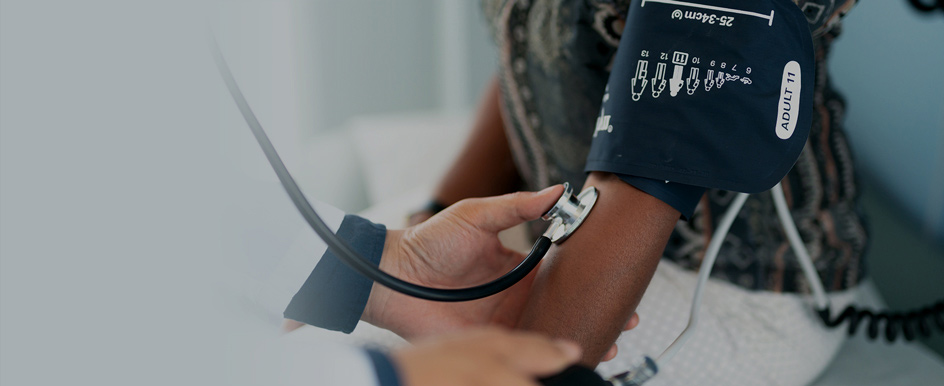Diagnosis
How We Can Help You
Hypertension, or high blood pressure, occurs when the force of the blood traveling through your blood vessels is too high. Left elevated, this can cause damage to your heart and arteries and lead to heart attack, stroke, and kidney failure.
We have experience treating the most complex types of hypertension. Our cardiologists, nephrologists, endocrinologists, geneticists, and radiologists work together to manage hypertension and help prevent possible complications.
What We Offer You for High Blood Pressure
- Advanced expertise from specialists who understand complex hypertension issues that other clinics may not have experience treating.
- Precise diagnostic tests, including 24-hour ambulatory blood pressure monitoring, cardiac testing, and genetic testing, so we can tailor your treatment.
- Team-based treatment planning that includes biweekly meetings where specialists from our Hypertension Clinic share expertise and discuss treatment options.
- Collaborative care between cardiologists, endocrinologists, nephrologists, radiologists, and psychologists to provide thorough, personalized treatment.
- Comprehensive support, including follow-up visits by phone, a heart-healthy eating plan tailored for you by a dietitian, and support groups.
- Active clinical trials program that gives patients access to the most promising treatment options and medications before they are available to the public.
Treatment for High Blood Pressure
At Stanford, we take a collaborative approach to treating hypertension. We bring together experts from cardiology, nephrology, radiology, and behavioral psychology to diagnose and treat the most complex cases. In fact, many people come to Stanford for hypertension treatment after unsuccessful treatment elsewhere.
To diagnose high blood pressure, we conduct a thorough physical exam and learn about your personal and family medical history. We also use diagnostic tests and screenings to determine if other conditions, like sleep apnea, are causing the hypertension.
We may use one approach or a combination to treat hypertension, including:
The specialists at Stanford’s Hypertension Clinic have experience successfully treating resistant and severe high blood pressure.
Medication
For some people, lifestyle changes alone are not enough to lower blood pressure. Your care team works with you to determine the drug or combination or drugs that best suits your needs. They also help lessen or manage any side effects from these or other medications. Medications to treat hypertension include:
- Angiotensin-converting enzyme (ACE) inhibitors: The hormone angiotensin narrows blood vessels. ACE inhibitors prevent angiotensin from forming, thus relaxing the blood vessels.
- Angiotensin II receptor blockers (ARBs): These drugs block the action of the hormone angiotensin to relax blood vessels.
- Beta blockers: This medication helps your heart beat slower and with less force by limiting the hormone adrenaline.
- Calcium channel blockers: These drugs block calcium from entering the cells of the heart and blood vessel muscles, which helps them relax.
- Diuretics (water pills): These pills flush excess water and salt from your body, decreasing the amount of fluid pumping through your arteries.
- Renin inhibitors: Your kidneys produce an enzyme called renin, which begins a chemical process that gradually increases blood pressure. These drugs slow renin production and the chemical process.
Renal denervation
Renal denervation targets nerves near the kidneys that regulate blood pressure. This minimally invasive procedure sends heat energy through a catheter (thin, flexible tube) placed in a kidney.
Lifestyle modification
Often the first step in treating hypertension is to build healthy lifestyle habits. Being overweight, eating too much salt, or getting poor sleep can all affect your blood pressure. The doctors at our Preventive Cardiology Clinic outline a treatment plan for you, and the behavioral psychologists and other specialists at our Cardiac Behavioral Medicine Program help you achieve those goals. They help you make small changes in your daily life that can reduce blood pressure, including:
- Losing weight and exercising
- Stopping smoking
- Reducing stress and improving sleep
- Limiting alcohol and salt
Your care providers support you in this process with in-person meetings or follow-ups by phone. We give you the tools you need to track your progress with apps and wearable devices (like activity trackers and at-home blood pressure monitors). Because this technology can sync up with our MyHealth system, your doctors can monitor your data in real time, too.
If you have sleep apnea, which can cause hypertension, you can meet with specialists at our Sleep Medicine Center for a thorough evaluation, including a sleep study, and treatment plan
Sleep medicine
If you have sleep apnea, which can cause hypertension, you can meet with specialists at our Sleep Medicine Center for a thorough evaluation, including a sleep study, and treatment plan.
Clinical Trials
Clinical trials evaluate new medical approaches, devices, drugs, and other treatments. As a Stanford Health Care patient, you may be eligible to participate in open clinical trials.
Open trials refer to studies that are currently recruiting participants or that may recruit participants in the near future. Closed trials are not currently enrolling, but similar studies may open in the future.






